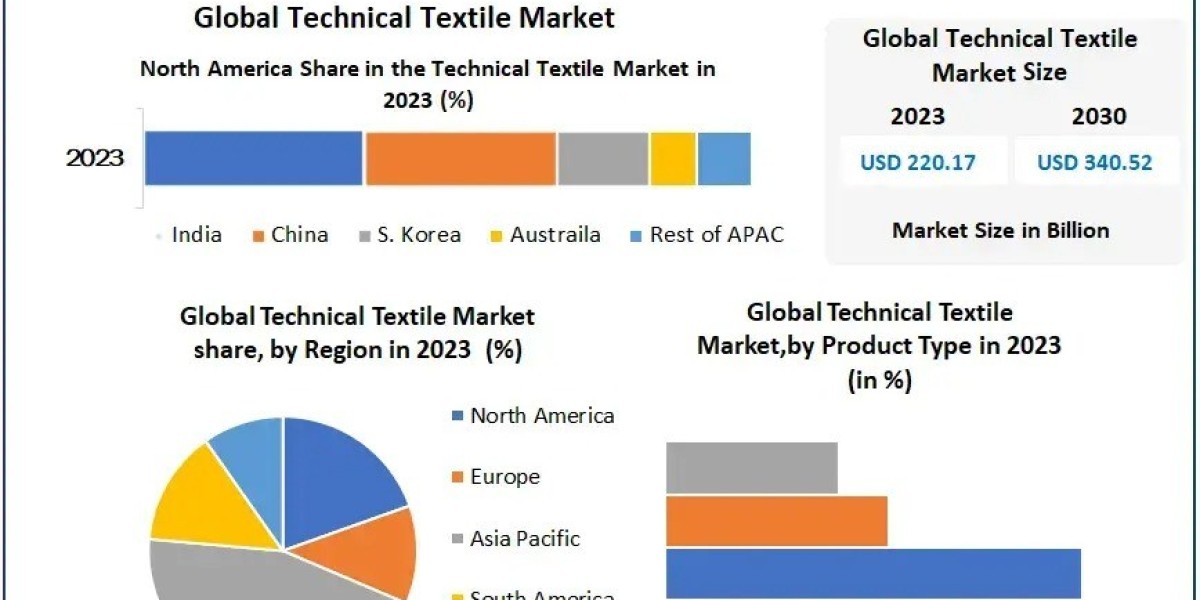The Technical Textile Market Share, valued at USD 220.17 billion in 2023, is anticipated to grow to USD 340.52 billion by 2030, exhibiting a compound annual growth rate (CAGR) of 7.01% during the forecast period. This significant growth is driven by advancements in material science and the increasing demand for high-performance textiles across various sectors.
Market Definition and Overview
Technical textiles are specialized textile materials designed primarily for their functional and performance characteristics rather than aesthetic appeal. They are engineered to meet stringent technical requirements and are utilized in a wide array of applications, including agriculture, healthcare, construction, automotive, and apparel. Examples include agrotextiles that protect crops, meditech textiles such as surgical gowns, geotextiles used in civil engineering, and mobiltech textiles that enhance automotive safety. The versatility of technical textiles makes them indispensable in numerous industries, driving continuous innovation to meet specific functional needs.
Click here for free sample + related graphs of the report @ https://www.maximizemarketresearch.com/request-sample/28487/
Key Growth Drivers and Opportunities
Several factors are contributing to the robust growth of the technical textile market:
Innovations in Material Science: The integration of nanotechnology into textile manufacturing has led to the development of fabrics with enhanced properties. Nanocoatings provide superior functionalities, nanofibers offer increased strength and comfort, and nanosensors have enabled the creation of smart textiles. These advancements have opened new avenues in wearable electronics and other cutting-edge applications, propelling the market forward.
Rising Demand for High-Performance Materials: Industries such as automotive, construction, and healthcare are increasingly seeking materials that offer superior performance characteristics. Technical textiles meet these demands by providing enhanced durability, flexibility, and specialized functionalities, making them ideal for use in demanding environments.
Environmental Sustainability: There is a growing emphasis on developing eco-friendly and sustainable textiles. The use of nanotechnology has facilitated the creation of sustainable fabrics, aligning with environmental initiatives and catering to the increasing consumer preference for green products.
Expansion in Emerging Economies: Rapid industrialization and urbanization in emerging economies have led to increased infrastructure development and healthcare investments, thereby boosting the demand for technical textiles in these regions.
To get this report buy full copy @ https://www.maximizemarketresearch.com/request-sample/28487/
Segmentation Analysis
The technical textile market is segmented based on material type, process, application, and region.
1. Material Type:
Synthetic Fibers: These include polyester, nylon, and aramid fibers, known for their strength, durability, and resistance to various environmental factors. They are widely used in applications such as automotive textiles, industrial fabrics, and protective clothing.
Natural Fibers: Comprising cotton, wool, and silk, natural fibers are valued for their biodegradability and comfort. They find applications in areas like medical textiles and geotextiles.
2. Process:
Woven: Traditional weaving techniques are employed to produce fabrics with high tensile strength, suitable for applications like geotextiles and protective clothing.
Non-Woven: These fabrics are made by bonding fibers together through chemical, mechanical, or thermal processes, resulting in materials used in hygiene products, medical textiles, and filtration.
Knitted: Knitting provides elasticity and comfort, making it ideal for applications in sportswear and medical textiles.
3. Application:
Agrotech (Agriculture): Technical textiles in agriculture include shading nets, mulch mats, and crop covers that enhance crop yield and protection.
Meditech (Medical): This segment encompasses products like surgical gowns, implants, and wound care materials that meet stringent hygiene and performance standards.
Buildtech (Construction): In construction, technical textiles are used in applications such as scaffolding nets, concrete reinforcement, and architectural membranes, contributing to building safety and longevity.
Mobiltech (Automotive): Automotive applications include airbags, seat belts, and interior fabrics that enhance vehicle safety and comfort.
Geotech (Geotechnical): Geotextiles are used in civil engineering projects for soil stabilization, erosion control, and drainage systems.
Know More About The Report: https://www.maximizemarketresearch.com/market-report/global-technical-textile-market/28487/
Competitive Landscape
The technical textile market is characterized by the presence of several key players who are driving innovation and expanding their market share through strategic initiatives. Notable companies include:
Asahi Kasei Corporation (Japan): A leading manufacturer known for its advanced technical textiles used in automotive and healthcare applications.
DuPont (USA): Renowned for its innovative materials, DuPont offers a range of technical textiles, including protective clothing and industrial fabrics.
Freudenberg & Co. KG (Germany): Specializes in non-woven technical textiles used in automotive, construction, and medical industries.
Country-Level Analysis
United States:
The U.S. technical textile market is experiencing significant growth, driven by advancements in material science and a strong demand for high-performance textiles across various industries. The automotive sector, in particular, has seen increased adoption of technical textiles in applications such as airbags and seat belts, contributing to enhanced vehicle safety. Additionally, the healthcare industry has embraced medical textiles, including surgical gowns and wound care products, to meet stringent hygiene standards. The focus on environmental sustainability has also led to the development of eco-friendly textiles, aligning with consumer preferences and regulatory requirements.
Germany:
Germany stands at the forefront of the technical textile market in Europe, owing to its strong industrial base and emphasis on innovation. The country's automotive industry extensively utilizes technical textiles for various applications, including interior components and safety features. In the construction sector, technical textiles are employed in geotextiles and architectural membranes, contributing to infrastructure development. Germany's commitment to environmental sustainability has also spurred the adoption of eco-friendly textiles, reflecting a broader trend towards green manufacturing practices.
Browse Related Report:
Green Data Center Market https://www.maximizemarketresearch.com/market-report/global-green-data-center-market/33302/
Warehouse Automation System Market https://www.maximizemarketresearch.com/market-report/warehouse-automation-system-market/167432/
About Us:
Maximize Market Research is one of the fastest-growing market research and business consulting firms serving clients globally. Our revenue impact and focused growth-driven research initiatives make us a proud partner of majority of the Fortune 500 companies. We have a diversified portfolio and serve a variety of industries such as IT & telecom, chemical, food & beverage, aerospace & defense, healthcare and others.
Contact Maximize Market Research:
MAXIMIZE MARKET RESEARCH PVT. LTD.
⮝ 3rd Floor, Navale IT park Phase 2,
Pune Banglore Highway, Narhe
Pune, Maharashtra 411041, India.
✆ +91 9607365656
? sales@maximizemarketresearch.com
? www.maximizemarketresearch.com







